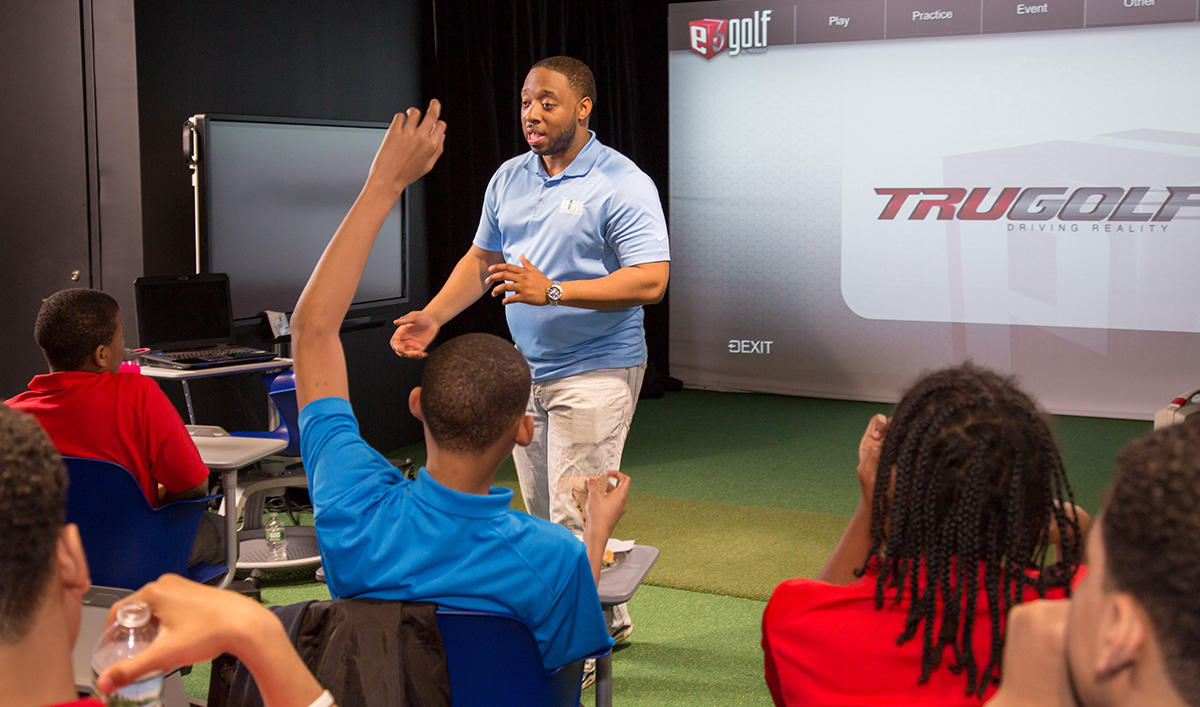
Reggie Mays, Jr., is the Program Coordinator for The Bridge Golf Foundation. He recently fielded some questions from Executive Director and Co-Founder Farrell Evans.
FE: You have been the Program Coordinator since the inception of the After School program in September 2015. Describe how your role has evolved over time and some of the daily challenges you face in this position?
RM: The program’s growth has required me to progress as well. I am not only an instructor and mentor to our young men, but I now feel as if we are all family.
The relationships that I have gained from this program bring me through the Foundation’s doors every day. My responsibility to our young men extends past the job, and I take that very seriously.
In order to maintain my good rapport with our young men, I know that I have to remain interesting and relevant. In today’s society, young people’s attention spans seem shorter. I believe this is due to the fact that they can access tremendous amounts of information in a brief amount of time. To keep their attention, I make sure that my lessons are reminiscent of the culture that they are a part of. My instruction is fast-paced but intuitive, just like a Google search.
This is not always easy, but I continuously remind myself that I need to embrace their learning styles and meet them where they are.
FE: What events in your life inspired you to pursue a career in youth development?
RM: I can’t point to one specific event, but I can say that my parents have been a big influence. Over the years, my parents have always made a point of sharing their knowledge, time and finances with young people. Whether my father was coaching a basketball team or my mother was taking a group to see a Broadway play, they continuously went above and beyond to ensure that every youth they encountered felt enriched. My parents’ selflessness is what inspires me the most. I strive and hope to be just as influential in the lives of others as they have been.
FE: What are some of the unique challenges that young men of color face in society, and what are we doing as an organization to address those issues?
RM: Too often, their voices are silenced. Authority figures in their lives make countless decisions for them without their input. This can make it hard for them to make decisions for themselves, which can result in risky behavior. At The Bridge Golf Foundation, we always ask our young men to share their thoughts and the reasoning behind their decisions. Acknowledging and validating their ideas lets our young men know that they are valued. We do not accept the old adage that children should be seen and not heard. The Foundation emphatically encourages our young men to use their voices to make a difference.
FE: What makes a good youth development worker?
RM: You can’t be afraid to share your own life experiences. I have encountered several youths in my career who felt alone and misunderstood because they believed that no one else had endured the things they were going through. To combat these emotions, I use my life as a learning tool whenever I can. Sharing the details of my day or the particulars of a time I overcame a hardship helps me build solid relationships. Once that bond is formed, young people will allow you to give them guidance. Ultimately, this allows me to have a deep impact on their lives.
FE: You lead a lot of the Foundation’s video projects. Why is it important to get students involved in storytelling?
RM: Many of our young men are very savvy in regards to social media. Through Instagram, Twitter and Snapchat, they have become acclimated with the process of storytelling. Whether they are viewing the content of their peers or creating their own, our young men are constantly inundated with polarizing images. I am cognizant of this, and I make an effort to refine the knowledge they already have and guide them down a path that enables them to positively represent themselves through media.
I often tell our young men that they must speak up for themselves because if they do not, someone else will do it for them. The content they have created does just that. It allows these young, motivated men of color to show that they are exceeding the standards that society has set for them. Our young men understand that no one can tell their story better than they can.
FE: Knowing what you know now at 32, what would you tell your 14-year-old self?
RM: I would tell the 14-year old Reggie Mays Jr. that he has the power to do anything he wants, as long as he works hard. I would let him know that he should not be afraid to sacrifice his time to practice and study hard because the benefits of being prepared are astronomical. Lastly, I would tell him to repeat this mantra to himself everyday: “My parents are right.”
FE: In character education, you connect the curriculum to the real world. Why is it so important to keep it real with the kids and connect what they are learning in the After School program with what they are facing as young men of color in society?
RM: As a youth, I found it peculiar that teachers and professors rarely seemed to connect their lessons with what I was encountering in the real world. Whenever I lead a lesson, I try my hardest to apply what we’re learning to their daily endeavors.
Character Education’s purpose is to help our young men gain skills that will follow them for the rest of their lives. As a man of color, I understand the importance of having a strong foundation, and that is what I impress upon them daily. Having real conversations with our young men today can save them from tomorrow’s mistakes.